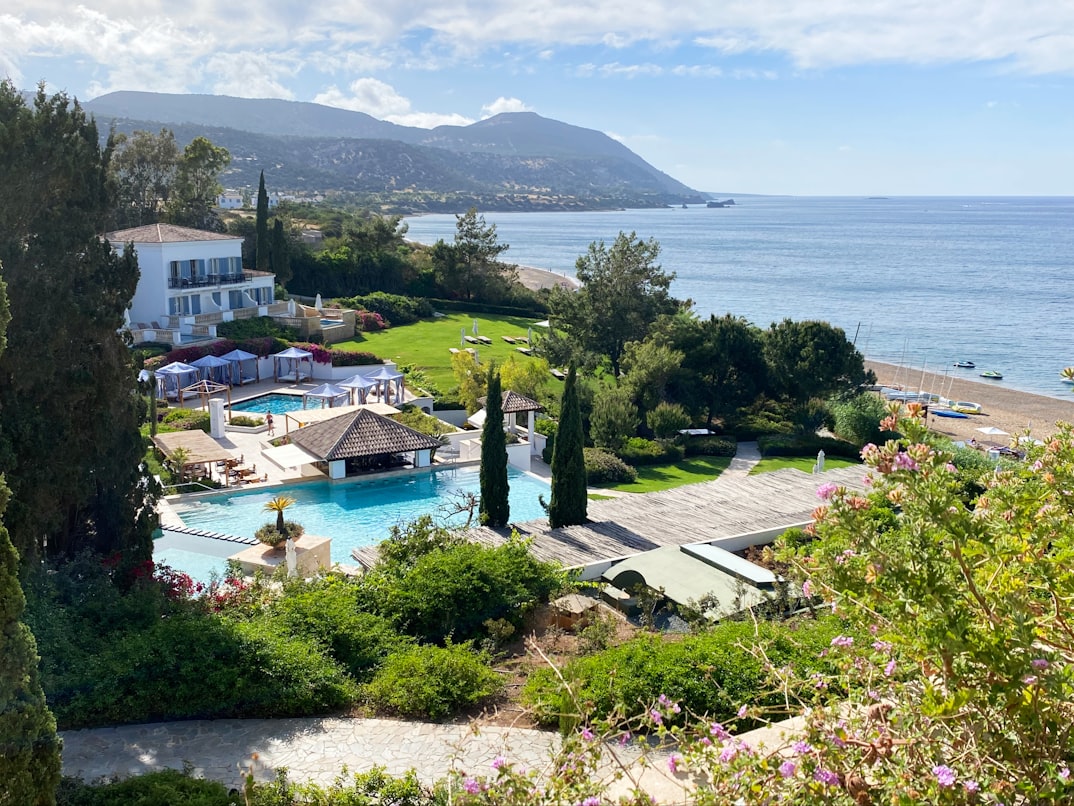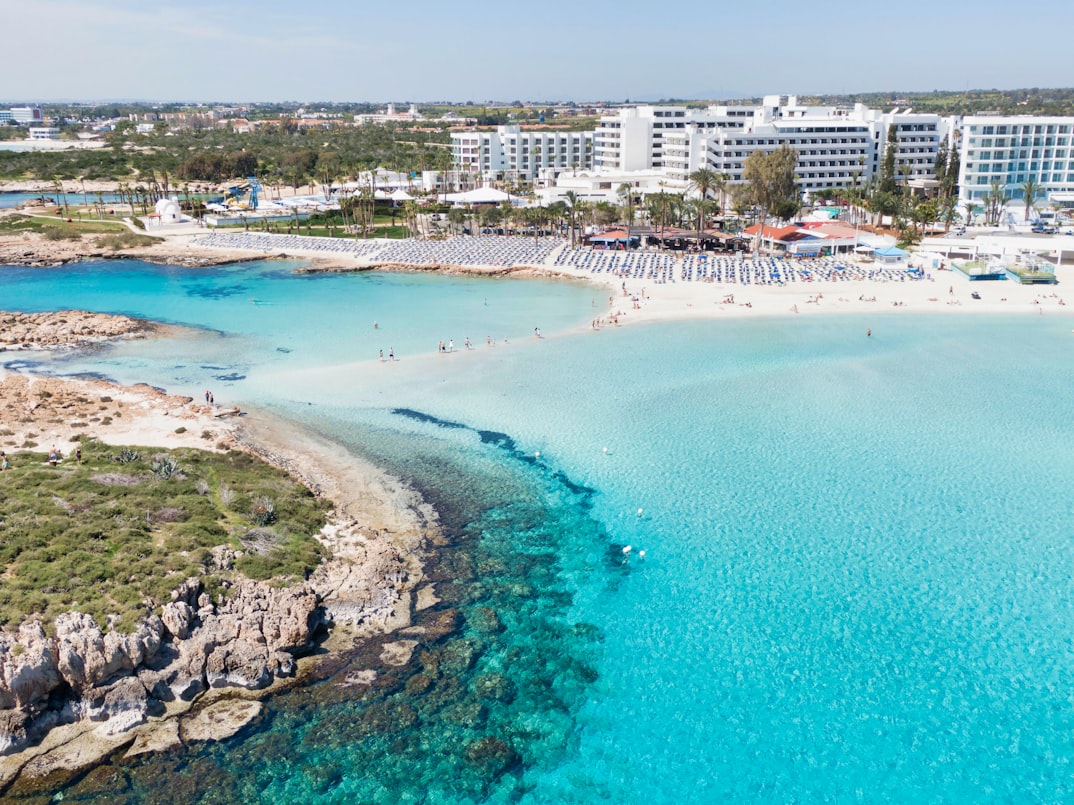Top Attractions
Cyprus is a captivating island in the eastern Mediterranean, offering a blend of ancient ruins, charming villages, sun-drenched beaches, and forested mountains. The divided capital city, Nicosia, provides a unique glimpse into two cultures—Greek Cypriot and Turkish Cypriot—within one historic city center. The ancient city of Kourion near Limassol boasts breathtaking Greco-Roman ruins set against a coastal cliff, including a remarkably preserved amphitheater. Paphos is another cultural gem, home to the UNESCO-listed Tombs of the Kings and intricate Roman mosaics at the House of Dionysos. Nature lovers should not miss the Troodos Mountains, where pine forests, waterfalls, and picturesque monasteries like Kykkos offer cool respite from the coast. Along the sea, Coral Bay and Fig Tree Bay are among the island’s most beautiful beaches, perfect for swimming and water sports.
Local Dishes
Cypriot cuisine is a delicious mosaic of Greek, Turkish, and Middle Eastern flavors, characterized by fresh ingredients and bold spices. A classic meze meal—a spread of up to 30 small dishes—is a must for food lovers, featuring everything from grilled halloumi cheese and stuffed vine leaves to spicy sausage (loukaniko) and dips like tzatziki and tahini. Souvlaki, small skewers of marinated meat served in warm pita bread with salad and sauces, is popular at street stalls and beachside cafes. Seafood is abundant, with octopus, calamari, and grilled seabream commonly featured in coastal restaurants. For dessert, try loukoumades (honey-soaked doughnuts) or glyko tou koutaliou (fruit preserves), usually offered with a glass of Cypriot coffee.
Transportation Tips
While Cyprus has a public bus system that connects most major cities and towns, renting a car is the best way to explore the island, especially if you want to visit remote mountain villages or quiet beaches. Driving is on the left-hand side of the road, and roads are generally in excellent condition. Taxis are common but can be expensive, and there are no ride-hailing apps like Uber, although some local apps such as Bolt operate in limited areas. Biking is a pleasant option in coastal cities like Larnaca and Paphos, where cycle lanes are becoming more common. Keep in mind that public transportation is more limited in rural areas and virtually nonexistent late at night.
Budget Travel Tips
Travelers on a budget can enjoy Cyprus without sacrificing experience by opting for local tavernas over tourist-oriented restaurants and staying in guesthouses or budget-friendly Airbnbs, especially in smaller towns like Polis or Kakopetria. Many beaches have no entrance fees, and you can easily pack a picnic from local bakeries and markets. Instead of taking guided tours, consider visiting archaeological sites like Ancient Salamis or Kolossi Castle independently—they're affordable and accessible by car or local bus. Traveling outside of peak summer months, especially in May or October, also helps save on accommodation and airfare while still enjoying excellent weather.
Safety Info
Cyprus is one of the safest destinations in Europe, with very low crime rates and a stable political environment. Petty theft such as pickpocketing is rare but still possible in crowded tourist zones, so standard precautions are recommended. Road safety is good, though rural roads can be narrow and winding—drive cautiously, especially in the mountains. The island’s division into Greek Cypriot and Turkish Cypriot zones is well-marked, and travelers should avoid crossing the UN buffer zone outside designated checkpoints. Tap water is safe to drink in most areas, and emergency services are efficient and accessible.
Cultural Etiquette
Cypriots are warm, proud, and hospitable people who value personal relationships and community. A handshake and friendly conversation are common greetings, and it’s customary to accept coffee or a treat when visiting someone’s home or shop. Modesty in dress is appreciated, especially when visiting churches or rural villages. In conversation, avoid sensitive political topics such as the island’s division unless you know your audience well. It’s polite to say “Kalimera” (good morning) or “Efharisto” (thank you) in Greek, or “Merhaba” and “Tesekkür ederim” in Turkish depending on which part of the island you’re in—locals appreciate the effort.
Travel Style Fit
Cyprus is a wonderfully versatile destination that appeals to a broad range of travel styles. It’s perfect for history buffs seeking ancient ruins, mythology, and cross-cultural landmarks, as well as nature lovers eager to hike in the Troodos Mountains or dive into the island’s clear coastal waters. Couples will enjoy the romantic beach sunsets and charming villages, while solo travelers will find it easy to navigate and connect with locals. Families can take advantage of kid-friendly beaches and outdoor adventures, and digital nomads will appreciate the reliable Wi-Fi and affordable cost of living in cities like Limassol. Whether you crave culture, relaxation, or exploration, Cyprus has something to offer.

Best Time to Visit
The best time to visit Cyprus is during spring (April to early June) and autumn (September to October), when the weather is warm and pleasant without the intense summer heat or crowds. During these shoulder seasons, the island is lush with wildflowers, ideal for hiking, sightseeing, and relaxing at the beach. July and August bring soaring temperatures, particularly inland, but coastal areas remain popular for their clear, warm waters. Winter months (December to February) are mild and ideal for exploring cultural sites without crowds, and the Troodos Mountains even offer occasional snow for skiing.
Accommodation Recommendations
Budget travelers will appreciate staying at Lemongrass Hostel in Limassol, which offers clean dorms, a social atmosphere, and a fully equipped kitchen near the city’s waterfront. For those seeking comfort without splurging, the Avlida Hotel in Paphos provides good value with spacious rooms, pools, and proximity to archaeological sites, while Cyprus Villages in Tochni offers traditional stone houses with self-catering options and countryside views. Luxury travelers can indulge at Anassa Hotel near Polis, a five-star resort with private beach access, a world-class spa, and Mediterranean elegance, or enjoy the sleek seaside modernity of the Amara in Limassol, known for its gourmet dining and panoramic sea views.
Languages Spoken
Greek is the official language in the south, while Turkish is spoken in the north. English is widely spoken throughout the island, especially in tourist areas, due to Cyprus’s history as a former British colony. Most signs, menus, and public information are available in English, and many Cypriots, especially younger generations, are fluent or conversational. In rural areas, English may be more limited, so learning a few Greek or Turkish phrases can go a long way in connecting with locals.
Currency
The official currency of the Republic of Cyprus is the Euro (EUR), while the Turkish Republic of Northern Cyprus uses the Turkish Lira (TRY). Euros are widely accepted in the north in tourist areas, but having a small amount of Lira can be helpful. Credit and debit cards are widely used, but some smaller vendors may still prefer cash. ATMs are readily available in cities and towns. Tipping 5–10% at restaurants is appreciated, though not always expected, and rounding up for taxi fares and cafe service is customary.
Common Traveler Mistakes to Avoid
Many visitors underestimate the driving distances and terrain when planning a short stay, leading to overly ambitious itineraries. It’s also common to neglect hydration and sun protection, especially during the intense summer sun—always carry water and sunscreen. Some travelers assume that Cyprus is entirely within the Schengen Zone, but it's not—check your visa status accordingly. Another frequent mistake is missing out on the local culture by staying only in resort areas; venture into traditional villages or the Turkish north for a more well-rounded experience. Finally, avoid discussing political matters around locals unless invited to do so.
Essential Apps & Tools
Google Maps works well across the island, but offline navigation apps like maps.me are helpful for mountain regions with weak signal. Cyprus By Bus provides current schedules for public transport. XE Currency helps with currency conversion between the Euro and Turkish Lira. Bolt is the go-to taxi app in major cities like Limassol and Nicosia. Visit Cyprus is the official tourism app and includes events, tips, and travel inspiration. WhatsApp is the standard for communicating with local hosts and tour providers.
Suggested Itinerary Styles
A well-rounded 7- to 10-day itinerary might begin in Larnaca for a relaxing beach day and a visit to the historic Church of Saint Lazarus. Then head west to Limassol for a mix of nightlife, culture, and the ancient ruins of Kourion. Spend a few days in Paphos exploring its Roman mosaics, nearby beaches, and coastal trails. Allocate time for a day trip into the Troodos Mountains for hiking, wine tasting, and visiting painted Byzantine churches. If you’re feeling adventurous, cross into Northern Cyprus via Nicosia and explore the port town of Kyrenia and the Bellapais Abbey. End your journey with a final sunset at Cape Greco on the island’s southeastern tip.
Fun Facts
Cyprus is one of the world’s oldest continuously inhabited places, with human activity dating back over 10,000 years. It’s also said to be the birthplace of Aphrodite, the Greek goddess of love, who is believed to have emerged from the sea foam at Petra tou Romiou. The island has more Blue Flag beaches than any other country per capita in Europe, signaling clean, eco-friendly coastal areas. Cyprus is also home to a rare breed of wild sheep called the mouflon, which roam the Troodos forests. Interestingly, it’s one of the few places in the world where you can ski in the morning and swim in the sea by afternoon.
